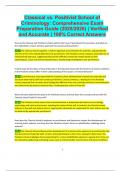Classical vs. Positivist School of
Criminology: Comprehensive Exam
Preparation Guide (2025/2026) | Verified
and Accurate | 100% Correct Answers
How do the Classical and Positivist schools address the issue of punishment for juveniles, and what are
the implications of each school’s approach for juvenile justice policies?
The Classical school supports a uniform approach to punishment for juveniles, arguing that the
severity of the crime should determine the punishment. The Positivist school, however, advocates for an
individualized approach, suggesting that juvenile offenders should be treated based on their
psychological, social, and environmental factors, emphasizing rehabilitation over punishment.
In what ways do the ideas of Cesare Beccaria in the Classical school and the theories of Cesare Lombroso
in the Positivist school differ in their understanding of the causes of criminal behavior?
Cesare Beccaria, associated with the Classical school, believed that criminals act rationally and
should be deterred by swift and certain punishment. Cesare Lombroso, a key figure in the Positivist
school, proposed that criminals were biologically different from non-criminals and that criminal behavior
was determined by physical characteristics, challenging the notion of free will.
What role does determinism play in the Positivist school, and how does this concept contrast with the
Classical school’s belief in free will?
The Positivist school asserts that criminal behavior is determined by factors such as biology,
psychology, and social environment, rejecting the notion of free will. In contrast, the Classical school
believes in free will and rational choice, arguing that individuals are responsible for their actions and can
be deterred by appropriate punishment.
How does the Classical school’s emphasis on punishment and deterrence impact the development of
criminal justice systems, and how does the Positivist school’s focus on rehabilitation challenge these
systems?
The Classical school influenced the development of criminal justice systems by promoting the idea
that punishment should be swift, certain, and proportionate to the crime, aiming for deterrence. The
Positivist school challenges this by advocating for a more rehabilitative approach, arguing that crime can
be reduced by addressing underlying causes such as mental health, environment, and social conditions.
1
, In what ways do the Classical and Positivist schools of criminology influence modern criminal profiling
techniques?
The Classical school, with its emphasis on rational choice and deterrence, has less influence on
modern criminal profiling, which focuses more on the characteristics and behaviors of offenders. The
Positivist school’s influence is stronger in modern criminal profiling, as it considers biological,
psychological, and environmental factors that contribute to criminal behavior, influencing forensic
psychology and criminal behavior analysis.
How does the Positivist school’s approach to social reform differ from the Classical school’s approach to
law enforcement, particularly regarding the treatment of marginalized groups?
The Positivist school advocates for social reform and the treatment of marginalized groups by
addressing underlying factors such as poverty, education, and mental health, with an emphasis on
rehabilitation. The Classical school, however, focuses on law enforcement and punishment, emphasizing
individual responsibility and equality before the law, without considering social or economic disparities.
What are the ethical implications of applying the Classical school’s philosophy of punishment to
contemporary criminal justice systems, especially in terms of fairness and justice?
The ethical implications of the Classical school’s philosophy involve concerns about fairness,
particularly in cases where individuals may not have full control over their behavior due to mental health
issues or social circumstances. The emphasis on deterrence and uniform punishment may be seen as
overly harsh or unjust when applied to individuals with different needs or life experiences.
How does the Positivist school’s view of criminal behavior as a product of social and environmental
factors shape policies aimed at crime prevention and rehabilitation?
The Positivist school views criminal behavior as influenced by factors such as upbringing,
socioeconomic status, mental health, and social environment. This leads to policies focused on crime
prevention through social reform, education, mental health services, and rehabilitation programs aimed
at addressing the root causes of criminal behavior.
In what ways does the concept of "moral responsibility" in the Classical school contrast with the
Positivist school’s emphasis on "social responsibility" in shaping public perceptions of crime?
The Classical school emphasizes individual moral responsibility, arguing that criminals are
responsible for their actions and should be held accountable through punishment. In contrast, the
Positivist school emphasizes social responsibility, suggesting that crime is a result of external factors such
as poverty, education, and family structure, and that society should address these factors to reduce
criminal behavior.
2




